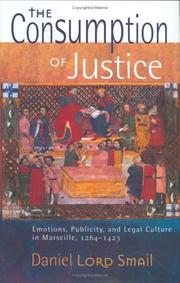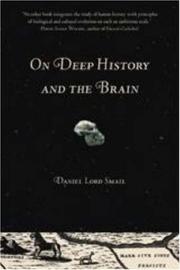| Listing 1 - 10 of 22 | << page >> |
Sort by
|

ISBN: 0801441056 Year: 2003 Volume: *1 Publisher: Ithaca ; London Cornell University Press
Abstract | Keywords | Export | Availability | Bookmark
 Loading...
Loading...Choose an application
- Reference Manager
- EndNote
- RefWorks (Direct export to RefWorks)
Justice, Administration of --- Law - Non-U.S. --- Law, Politics & Government --- Law - Europe, except U.K. --- Administration of justice --- Law --- Courts --- History --- Law and legislation --- History of the law --- History of France --- anno 1200-1299 --- anno 1300-1399 --- anno 1400-1499 --- Marseilles --- History. --- Marseille (France) --- Social life and customs. --- Justice [Administration of ] --- France --- Social life and customs

ISBN: 9780520252899 9780520258129 0520252896 0520258126 Year: 2007 Publisher: Berkeley: University of California press,
Abstract | Keywords | Export | Availability | Bookmark
 Loading...
Loading...Choose an application
- Reference Manager
- EndNote
- RefWorks (Direct export to RefWorks)
"When does history begin? What characterizes it? This book challenges the idea that history comes into being only with writing, civilization, or historical consciousness and offers a model that breaks the continuing grip of the Judeo-Christian time frame. Freeing history from its dependence on written evidence, On Deep History and the Brain argues that in the wake of the 1990s, the decade of the brain, the time has come for fundamentally new ways of thinking about our past. Daniel Lord Smail shows how the latest work in evolution and paleohistory makes it possible to join the recent past with the deep past and abandon, once and for all, the idea of prehistory."--BOOK JACKET.
Philosophy of nature --- Prehistory --- History --- Histoire --- Philosophy. --- Philosophie --- Human evolution. --- Neurosciences. --- Philosophie de l'histoire. --- 159.9 --- Psychologie --- Philosophy --- History, Modern --- History - Philosophy
Book
ISBN: 9780674737280 0674737288 0674970101 0674970128 9780674970106 Year: 2016 Publisher: Cambridge, Mass.: Harvard university press,
Abstract | Keywords | Export | Availability | Bookmark
 Loading...
Loading...Choose an application
- Reference Manager
- EndNote
- RefWorks (Direct export to RefWorks)
As Europe began to grow rich during the Middle Ages, its wealth materialized in the well-made clothes, linens, and wares of ordinary households. Such items were indicators of one’s station in life in a society accustomed to reading visible signs of rank. In a world without banking, household goods became valuable commodities that often substituted for hard currency. Pawnbrokers and resellers sprang up, helping push these goods into circulation. Simultaneously, a harshly coercive legal system developed to ensure that debtors paid their due.Focusing on the Mediterranean cities of Marseille and Lucca, Legal Plunder explores how the newfound wealth embodied in household goods shaped the beginnings of a modern consumer economy in late medieval Europe. The vigorous trade in goods that grew up in the fourteenth and fifteenth centuries entangled households in complex relationships of credit and debt, and one of the most common activities of law courts during the period was debt recovery. Sergeants of the law were empowered to march into debtors’ homes and seize belongings equal in value to the debt owed. These officials were agents of a predatory economy, cogs in a political machinery of state-sponsored plunder.As Daniel Smail shows, the records of medieval European law courts offer some of the most vivid descriptions of material culture in this period, providing insights into the lives of men and women on the cusp of modern capitalism. Then as now, money and value were implicated in questions of power and patterns of violence.
History of Europe --- anno 1400-1499 --- anno 1300-1399 --- Debt --- Collecting of accounts --- Material culture --- History --- Europe --- Economic conditions --- Conditions économiques --- Collecting of accounts. --- Debt. --- Economic history. --- Material culture. --- Culture --- Folklore --- Technology --- History, Economic --- Economics --- Indebtedness --- Finance --- Accounts, Collecting of --- Bad debt losses --- Bad debts --- Bill collecting --- Bill collection --- Bills, Collecting of --- Collection letters --- Collection of accounts --- Collection of debt --- Debt collection --- Debt recovery --- Loan losses --- Recovery of debt --- Credit --- Uncollectible accounts --- Management --- Council of Europe countries --- Eastern Hemisphere --- Eurasia --- History. --- Dettes --- Créances --- Culture matérielle --- Histoire --- Recouvrement --- Naturalwirtschaft. --- Verbindlichkeiten. --- Mobiliarzwangsvollstreckung. --- Hausrat. --- To 1500. --- Europe. --- France --- Italy --- Frankreich. --- Italien. --- Créances --- Culture matérielle --- Conditions économiques --- E-books --- Economic history --- Debt - Italy - Lucca - History - To 1500 --- Collecting of accounts - Italy - Lucca - History - To 1500 --- Material culture - Italy - Lucca - History - To 1500 --- Debt - France - Marseille - History - To 1500 --- Collecting of accounts - France - Marseille - History - To 1500 --- Material culture - France - Marseille - History - To 1500 --- Europe - Economic conditions - To 1492

ISBN: 9780801478888 9780801468780 0801468787 080147888X 0801441056 9780801441059 0801468779 1322504563 Year: 2013 Publisher: Ithaca (N.Y.): Cornell university press,
Abstract | Keywords | Export | Availability | Bookmark
 Loading...
Loading...Choose an application
- Reference Manager
- EndNote
- RefWorks (Direct export to RefWorks)
In the thirteenth and fourteenth centuries, the ideas and practices of justice in Europe underwent significant change as procedures were transformed and criminal and civil caseloads grew apace. Drawing on the rich judicial records of Marseille from the years 1264 to 1423, especially records of civil litigation, this book approaches the courts of law from the perspective of the users of the courts (the consumers of justice) and explains why men and women chose to invest resources in the law.Daniel Lord Smail shows that the courts were quickly adopted as a public stage on which litigants could take revenge on their enemies. Even as the new legal system served the interest of royal or communal authority, it also provided the consumers of justice with a way to broadcast their hatreds and social sanctions to a wider audience and negotiate their own community standing in the process. The emotions that had driven bloodfeuds and other forms of customary vengeance thus never went away, and instead were fully incorporated into the new procedures.
Justice, Administration of --- HISTORY --- Europe / France --- Administration of justice --- Law --- Courts --- History. --- Law and legislation --- Marseille (France) --- Marseilles (France) --- Marsel' (France) --- Marsiglia (France) --- Marsiho (France) --- Marsella (France) --- Social life and customs.

ISBN: 1282359347 9786612359347 0520934164 1435603982 9780520934160 9781435603981 9781282359345 9780520252899 0520252896 Year: 2008 Publisher: Berkeley University of California Press
Abstract | Keywords | Export | Availability | Bookmark
 Loading...
Loading...Choose an application
- Reference Manager
- EndNote
- RefWorks (Direct export to RefWorks)
When does history begin? What characterizes it? This brilliant and beautifully written book dissolves the logic of a beginning based on writing, civilization, or historical consciousness and offers a model for a history that escapes the continuing grip of the Judeo-Christian time frame. Daniel Lord Smail argues that in the wake of the Decade of the Brain and the best-selling historical work of scientists like Jared Diamond, the time has come for fundamentally new ways of thinking about our past. He shows how recent work in evolution and paleohistory makes it possible to join the deep past with the recent past and abandon, once and for all, the idea of prehistory. Making an enormous literature accessible to the general reader, he lays out a bold new case for bringing neuroscience and neurobiology into the realm of history.
History --- Philosophy. --- Mental philosophy --- Humanities --- History, Modern --- Philosophy --- academic. --- church history. --- civilization. --- darwin. --- evolution. --- historical conscious. --- historical. --- history. --- judeo christian. --- lamarck. --- literature. --- logical. --- neurobiology. --- neuroscience. --- paleohistory. --- prehistory. --- psychotropy. --- religious history. --- religious studies. --- sacred history. --- sacred. --- scholarly. --- science. --- scientific. --- world history. --- writing. --- written communication.
Book
Year: 2003 Publisher: [Place of publication not identified] Cornell University Press
Abstract | Keywords | Export | Availability | Bookmark
 Loading...
Loading...Choose an application
- Reference Manager
- EndNote
- RefWorks (Direct export to RefWorks)
Justice, Administration of --- History --- Marseille (France) --- Social life and customs.
Book
ISBN: 9781501718090 Year: 2018 Publisher: Ithaca, NY
Abstract | Keywords | Export | Availability | Bookmark
 Loading...
Loading...Choose an application
- Reference Manager
- EndNote
- RefWorks (Direct export to RefWorks)
Digital
ISBN: 9780674970106 Year: 2016 Publisher: Cambridge, Mass. Harvard University Press
Abstract | Keywords | Export | Availability | Bookmark
 Loading...
Loading...Choose an application
- Reference Manager
- EndNote
- RefWorks (Direct export to RefWorks)
Digital
ISBN: 9780801468780 9780801478888 Year: 2013 Publisher: Ithaca, N.Y. Cornell University Press
Abstract | Keywords | Export | Availability | Bookmark
 Loading...
Loading...Choose an application
- Reference Manager
- EndNote
- RefWorks (Direct export to RefWorks)
Multi
ISBN: 9781501718090 Year: 2018 Publisher: Ithaca, N.Y. Cornell University Press
Abstract | Keywords | Export | Availability | Bookmark
 Loading...
Loading...Choose an application
- Reference Manager
- EndNote
- RefWorks (Direct export to RefWorks)
| Listing 1 - 10 of 22 | << page >> |
Sort by
|

 Search
Search Feedback
Feedback About UniCat
About UniCat  Help
Help News
News